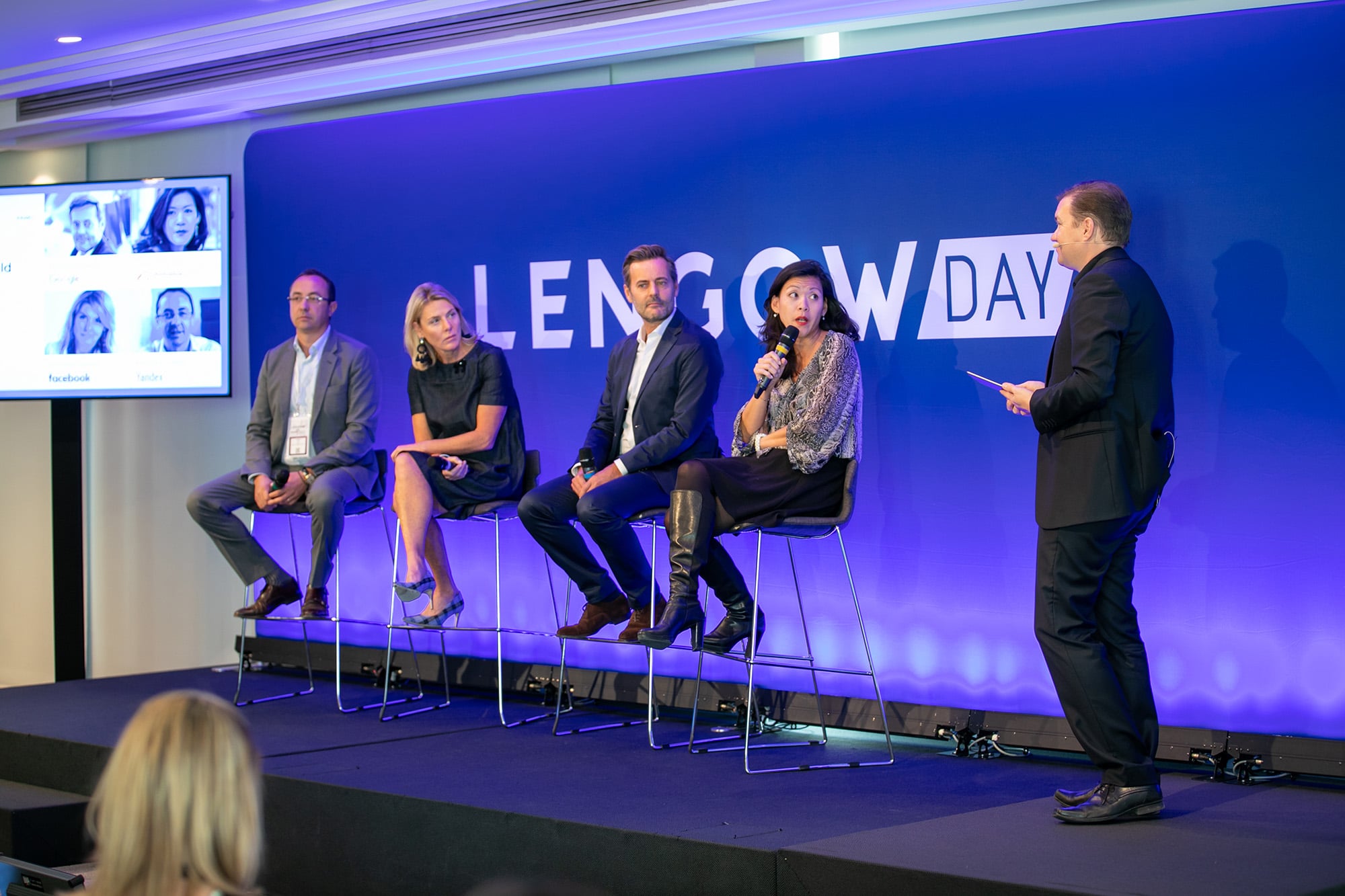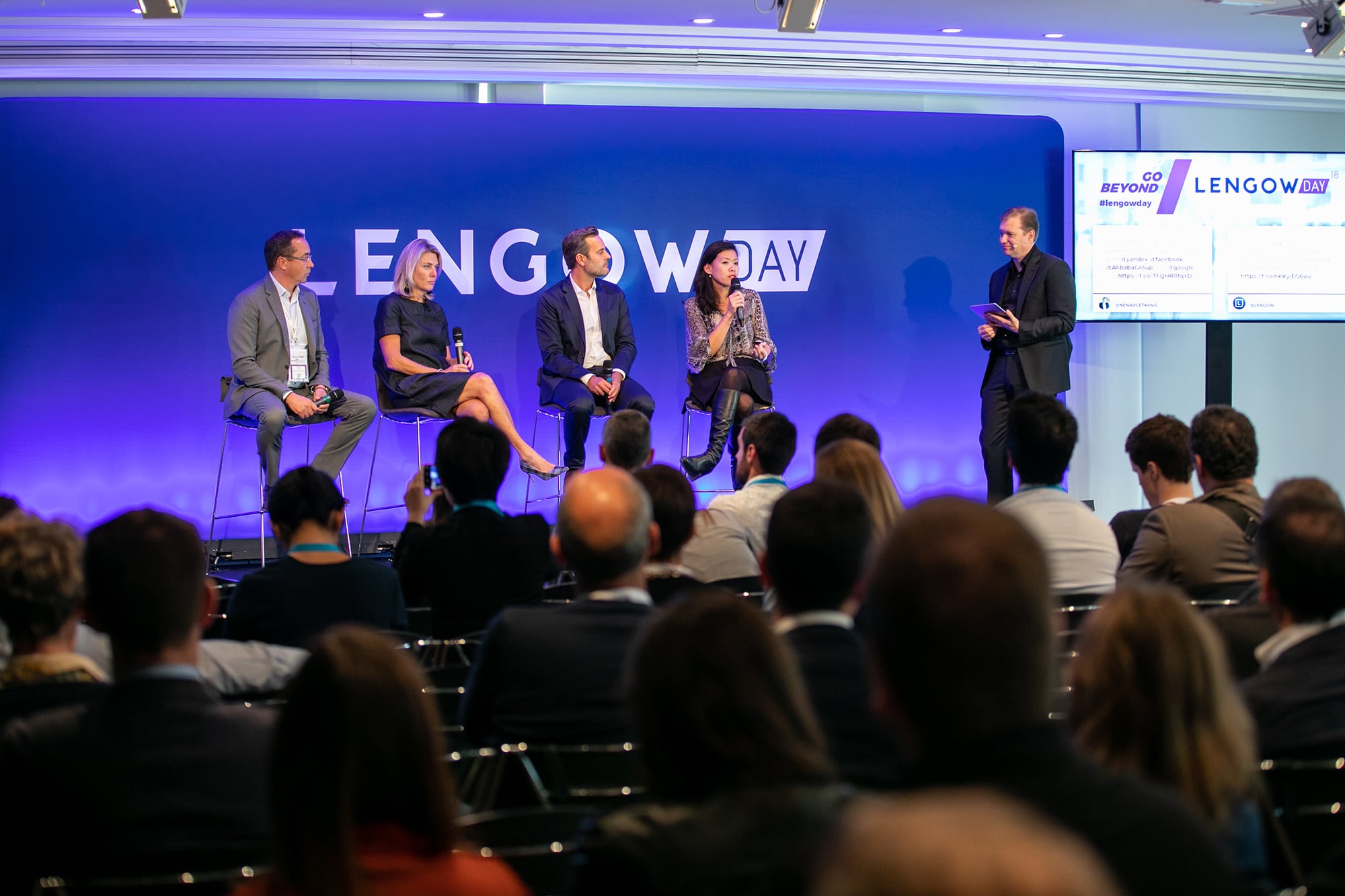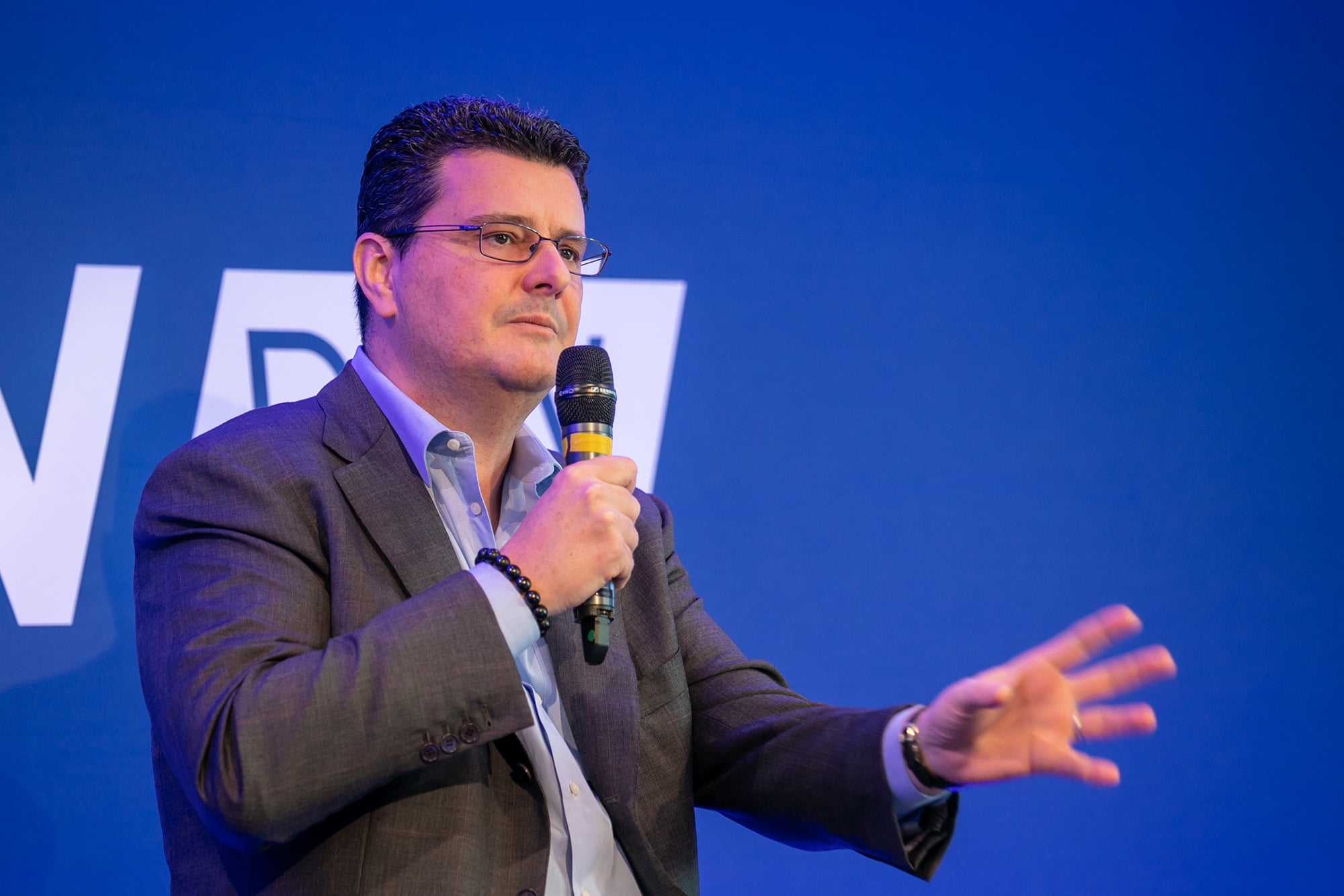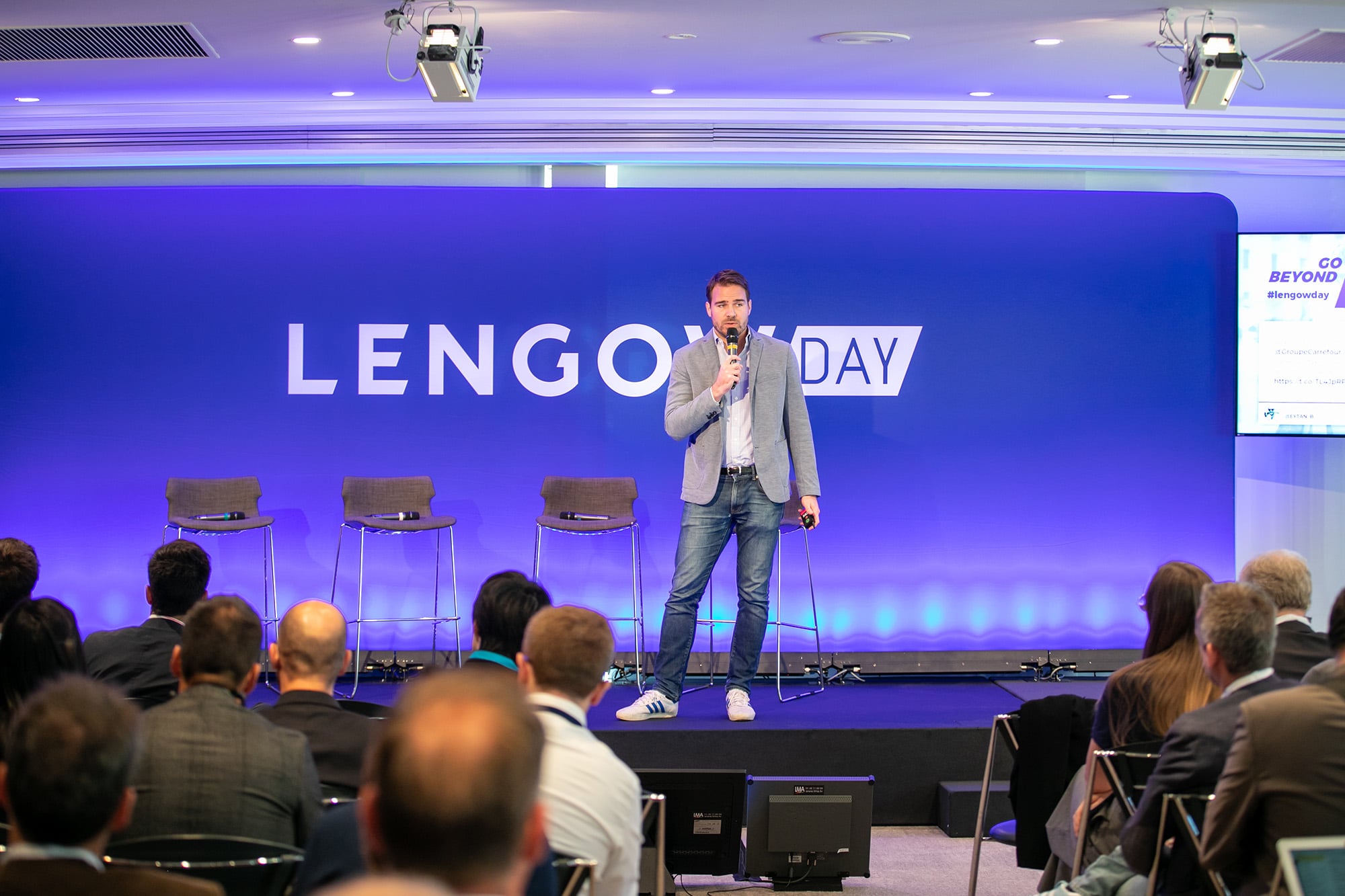Lengow Day 2018: key takeaways from our 6th year (part 2)
31/10/18
4'
27th September saw our 6th annual Lengow Day. This year was all about highlighting a key aspect of ecommerce: the customer. The challenge retailers are facing is reaching their customers in the right place at the right time. Let’s take a look back on the topics that we discussed in the second part of the day, in a discussion called “Think Better, Act Closer”.
Innovating the e-commerce of tomorrow
We couldn’t discuss the future of e-commerce without inviting some key players who revolve around this market: Laura Pho Duc (Head of Marketing & Communication – Alibaba), Francois Loviton (Director Brands & Retail – Google), Annelies Jansen (Director, Global Marketplace Partnerships – Facebook) and Bernard Lukey (General Director Yandex Europe AG – Yandex).
They all share the same objective – to either obtain or maintain a leading position in global e-commerce – but each of them have opted for different strategies. Alibaba‘s main objective is, for example, to facilitate the relationship between buyers and sellers in all sectors around the world. Google, however, wants sellers to engage in conversation with their customers through “micro-moments” in order to reach them at the right time, with the right message and via the right platform.
As for Facebook, the social network is constantly evolving its platform by feeding off market trends. For example, three years ago, Facebook realised that in some countries a third of all users were buying or selling on the social network. With this in mind, they began to improve the e-commerce platform to facilitate these users and improve their experience. For Yandex, the number one search engine in Russia, cross-border trading is essential. To facilitate this, they multiplied their investments to create an international platform that allows retailers all over the world to have access to more than 90 million monthly users on Yandex.
“We build all of our products around the customers. This doesn’t just mean technology and services, but content too,” says Laura Pho Duc (Alibaba).
According to Laura Pho Duc (Alibaba), it is consumers (trends, needs, etc.) that will drive innovation for the future of e-commerce. For example, Chinese consumers equate shopping as entertainment. They represent an important purchasing power, but they have buying habits that are totally different from what we know in Europe. And it is this behaviour that will influence the consumers of tomorrow, all over the world.
Consumers want access to brands from around the world, from their phone to their home, and as quickly and easily as possible. “This is why the Chinese market is a pilot market for international merchants, where projects are not subject to friction and where it is possible for innovation to take place quickly”. The challenge is therefore for these e-commerce players to find the best strategy to get in touch with consumers, when their behaviour is constantly evolving.
This outlook is shared by François Loviton (Google) and Annelies Jansen (Facebook). François Loviton (Google) stresses the importance of providing consumers with a seamless experience, by offering them a high quality, varied and comprehensive service via platforms: “Consumers are evolving very quickly. There is a risk for many retailers to not be fast enough to grab their attention.” Annelies Jansen (Facebook) adds that consumers are evolving faster than technology, and Bernard Lukey (Yandex) claims that “the speed of technological development is unimaginable”, and that artificial intelligence will fuel most businesses, and certainly the e-commerce, of tomorrow.
Annelies Jansen (Facebook) mentions that one of the greatest innovations in the e-commerce industry is the growth of distribution channels. For Laura Pho Duc (Alibaba), it’s the blockchain that can really affect transactions and the way we do business. Bernard Lukey (Yandex), meanwhile, is convinced that the future of business is in voice assistants, and took the opportunity to introduce Alissa, the personal assistant developed by Yandex. And lastly, according to François Loviton (Google), everything is a question of data – that must become the backbone of trade.
Artificial intelligence isn’t magic
Jean-Philippe Desbiolles (Vice President Cognitive Solutions – IBM Watson Group) shared his vision on artificial intelligence, which he describes as “the end of the code”; transitioning from a world of programming to a world of learning, in which humans will teach things to the machine.
According to Jean-Philippe Desbiolles (IBM Watson), artificial intelligence is going to be a long journey, and we’re only just getting started. At IBM Watson, Jean-Philippe Desbiolles (IBM Watson) works around three key areas. First – the customer experience (UI / UX) through language, conversation, hyper-personalisation, and the ability to understand who you are. The second area is empowering people to help them do what they do better. The final challenge will be to move from automating processes to setting up smarter processes.
Jean-Philippe Desbiolles (IBM Watson) insisted that intelligence doesn’t just appear like magic, and that it takes time to build. He added that we will one day live in an augmented world, which is why we must now begin to understand it.
Dynamic Ads, a new channel for selling your products
Now more “mobile first” than ever, Facebook has more than 2 billion active users each month on its platform, more than 90% of the traffic comes from mobile. In a talk titled “How to drive demand and sales with Dynamic Ads” Guillaume Cavaroc (Retail Industry Manager at Facebook) shared his tips and best practices to help retailers optimise their product catalogues on the social network.
Facebook has been building on and improving their Dynamic Ads for three years. They have recently developed new features to allow retailers to make their offer available to even more people.
As a reminder, this cross-device advertising format allows retailers to promote their entire product catalogue in the right place and at the right time on Facebook, Instagram, Audience Network and recently within Messenger and Marketplace. With Marketplace, advertisers gain access to an advertising space with strong buying intent, as one-third of the Facebook community visits Marketplace each month. The platform was initially reserved for individuals, but Marketplace has gradually opened to B2C partners.

Initially dedicated to retargeting (see our white paper on Dynamic Ads), Facebook evolved its Dynamic Ads at the end of 2017 by launching Broad Audience, with more of a focus on prospecting. With this new targeting, retailers can reach people beyond their online store or mobile app. The goal? Talk to people who are not customers, who have never visited your e-commerce site but have shown interest in products similar to yours.
Don’t just wait for purchase intent, create purchase intent
The challenge will be for sellers to choose the best targeting option, Retargeting or Broad Audience, to achieve their campaign goals. Dynamic Ads now represent 25% of investments in France compared to 16% a year ago
Your e-commerce library
E-commerce for Retailers
Learn moreE-commerce for Brands
Learn moreL'Oréal Luxe Success Story
Learn moreSign up for our newsletter
By submitting this form you authorize Lengow to process your data for the purpose of sending you Lengow newsletters . You have the right to access, rectify and delete this data, to oppose its processing, to limit its use, to render it portable and to define the guidelines relating to its fate in the event of death. You can exercise these rights at any time by writing to dpo@lengow.com

Trending Posts
Marketing channels
Where does Gen Z shop online?
Gen Z online shopping is transforming the digital marketplace, setting trends that redefine what it means to engage with brands…
16/04/24
9'
Marketplaces
The Top 10 Marketplaces in Europe
The e-commerce scene is a vibrant mix of marketplaces in Europe. These aren't just websites; they're bustling hubs where millions…
08/12/23
7'
Marketplaces
Lengow Now Fully Supports Zalando Logistics Solutions ZSS and ZRS
Zalando, one of Europe’s leading fashion marketplaces, continues to raise the bar with its advanced logistics and fulfillment programs. After…
12/12/24
4'
Marketplaces
How to win the Buy Box on Marketplaces (Amazon, Zalando, etc.)
What is the most important thing for marketplace sellers? Exactly, the Buy Box! If you don't have the Buy Box…
02/04/24
10'
Marketplaces
How to Sell on Temu? Best Tips
Emerging under the vast umbrella of PDD Holdings Inc., Temu has skyrocketed in popularity as a shopping sensation from China…
17/08/23
5'








